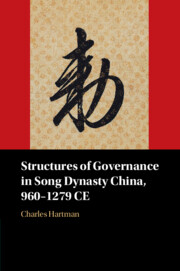Book contents
- Structures of Governance in Song Dynasty China, 960–1279 CE
- Structures of Governance in Song Dynasty China, 960–1279 CE
- Copyright page
- Contents
- Figures
- Tables
- Preface
- Notes on the Cover and on the Text
- Introduction
- Part I Dual Faces of the Song State
- Part II The Technocratic and Confucian Models of Governance
- 6 Agents of Technocracy
- 7 The Northern Song Technocratic State
- 8 The Confucian Challenge
- Part III Interactions
- Appendix of Senior Administration Positions, 1162–1182
- Bibliography
- Index
6 - Agents of Technocracy
from Part II - The Technocratic and Confucian Models of Governance
Published online by Cambridge University Press: 30 March 2023
- Structures of Governance in Song Dynasty China, 960–1279 CE
- Structures of Governance in Song Dynasty China, 960–1279 CE
- Copyright page
- Contents
- Figures
- Tables
- Preface
- Notes on the Cover and on the Text
- Introduction
- Part I Dual Faces of the Song State
- Part II The Technocratic and Confucian Models of Governance
- 6 Agents of Technocracy
- 7 The Northern Song Technocratic State
- 8 The Confucian Challenge
- Part III Interactions
- Appendix of Senior Administration Positions, 1162–1182
- Bibliography
- Index
Summary
Chapter 6, “Agents of Technocracy,” begins with the premise that the Song founders inherited a robust system of technocratic governance that had evolved after the collapse of Tang centralized authority in the middle of the eighth century. Its features included the rise of “commissions” (shizhi 使職) to replace the fossilized Three Departments (Sansheng 三省) structure of early Tang as well as inner court control over imperial decision making, financial administration, and security. The Song founders succeeded in coordinating these structures, all the while preserving many of their essential elements in a centralized and much strengthened monarchy. This chapter features the first detailed, English-language studies of the principal non-literati, non-Confucian groups that were vital to this imperial technocratic governance – the female members of the monarchy, including the empresses and the palace female bureaucracy, the eunuchs, the military servitors, and clerks. This chapter seeks to by-pass the aspersions that traditional historiography has cast upon these groups in order to examine their internal dynamics and to describe their administrative functions and their place within larger Song political culture.
- Type
- Chapter
- Information
- Structures of Governance in Song Dynasty China, 960–1279 CE , pp. 143 - 182Publisher: Cambridge University PressPrint publication year: 2023

